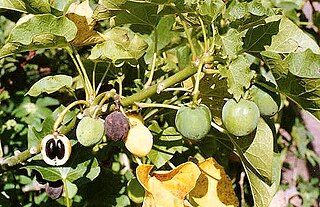
Biofuel is a fuel that is produced over a short time span from biomass, rather than by the very slow natural processes involved in the formation of fossil fuels such as oil. Biofuel can be produced from plants or from agricultural, domestic or industrial biowaste. Biofuels are mostly used for transportation, but can also be used for heating and electricity. Biofuels are regarded as a renewable energy source. The use of biofuel has been subject to criticism regarding the "food vs fuel" debate, varied assessments of their sustainability, and possible deforestation and biodiversity loss as a result of biofuel production.

Biodiesel is a renewable biofuel, a form of diesel fuel, derived from biological sources like vegetable oils, animal fats, or recycled greases, and consisting of long-chain fatty acid esters. It is typically made from fats.

Camelina is a genus within the flowering plant family Brassicaceae. The Camelina species, commonly known as false flax, are native to Mediterranean regions of Europe and Asia. Most species of this genus have been little studied, with the exception of Camelina sativa, historically cultivated as an oil plant. Heinrich Johann Nepomuk von Crantz was the first botanist to use the genus Camelina in his classification works in 1762.

Camelina sativa is a flowering plant in the family Brassicaceae usually known as camelina, gold-of-pleasure, or false flax, but also occasionally as wild flax, linseed dodder, German sesame, or Siberian oilseed. It is native to Europe and areas of Central Asia, but cultivated as an oilseed crop mainly in Europe and in North America. It is not related to true flax, in the family Linaceae.

This article describes the use and availability of biodiesel in various countries around the world.
Neste MY Renewable Diesel is a vegetable oil refining fuel production process commercialized by the Finnish oil and refining company Neste. Whether as an admixture or in its pure form, Neste MY Renewable Diesel is able to supplement or partially replace diesel fuel without problems. Neste MY Renewable Diesel guarantees that every gallon sold meets ASTM D975 and EN 15940 specifications in compliance with OEM standards.

Biofuel development in India centres mainly around the cultivation and processing of Jatropha plant seeds, which are very rich in oil, ranging from 27 to 40%, and averaging 34.4%. The drivers for this are historic, functional, economic, environmental, moral and political.
The United States produces mainly biodiesel and ethanol fuel, which uses corn as the main feedstock. The US is the world's largest producer of ethanol, having produced nearly 16 billion gallons in 2017 alone. The United States, together with Brazil accounted for 85 percent of all ethanol production, with total world production of 27.05 billion gallons. Biodiesel is commercially available in most oilseed-producing states. As of 2005, it was somewhat more expensive than fossil diesel, though it is still commonly produced in relatively small quantities, in comparison to petroleum products and ethanol fuel.
Biofuel is fuel that is produced from organic matter (biomass), including plant materials and animal waste. It is considered a renewable source of energy that can assist in reducing carbon emissions. The two main types of biofuel currently being produced in Australia are biodiesel and bioethanol, used as replacements for diesel and petrol (gasoline) respectively. As of 2017 Australia is a relatively small producer of biofuels, accounting for 0.2% of world bioethanol production and 0.1% of world biodiesel production.

Vegetable oils are increasingly used as a substitute for fossil fuels. Vegetable oils are the basis of biodiesel, which can be used like conventional diesel. Some vegetable oil blends are used in unmodified vehicles, but straight vegetable oil often needs specially prepared vehicles which have a method of heating the oil to reduce its viscosity and surface tension, sometimes specially made injector nozzles, increased injection pressure and stronger glow-plugs, in addition to fuel pre-heating is used. Another alternative is vegetable oil refining.
Second-generation biofuels, also known as advanced biofuels, are fuels that can be manufactured from various types of non-food biomass. Biomass in this context means plant materials and animal waste used especially as a source of fuel.
China has set the goal of attaining one percent of its renewable energy generation through bioenergy in 2020.

Algae fuel, algal biofuel, or algal oil is an alternative to liquid fossil fuels that uses algae as its source of energy-rich oils. Also, algae fuels are an alternative to commonly known biofuel sources, such as corn and sugarcane. When made from seaweed (macroalgae) it can be known as seaweed fuel or seaweed oil.
Hydrotreated vegetable oil (HVO) is a biofuel made by the hydrocracking or hydrogenation of vegetable oil. Hydrocracking breaks big molecules into smaller ones using hydrogen while hydrogenation adds hydrogen to molecules. These methods can be used to create substitutes for gasoline, diesel, propane, kerosene and other chemical feedstock. Diesel fuel produced from these sources is known as green diesel or renewable diesel.

Sustainable biofuel is biofuel produced in a sustainable manner. It is not based on petroleum or other fossil fuels. It includes not using plants that are used for food stuff to produce the fuel thus disrupting the world's food supply.

An aviation biofuel is a biofuel used to power aircraft and is a sustainable aviation fuel (SAF). The International Air Transport Association (IATA) considers it a key element in reducing the environmental impact of aviation. Aviation biofuel is used to decarbonize medium and long-haul air travel. These types of travel generate the most emissions, and could extend the life of older aircraft types by lowering their carbon footprint. Synthetic paraffinic kerosene (SPK) refers to any non-petroleum-based fuel designed to replace kerosene jet fuel, which is often, but not always, made from biomass.

SG Biofuels is a privately held bioenergy crop company, which grows and researches Jatropha curcas for the production of biodiesel, bio jet fuel, and specialty chemicals.

The indirect land use change impacts of biofuels, also known as ILUC or iLUC, relates to the unintended consequence of releasing more carbon emissions due to land-use changes around the world induced by the expansion of croplands for ethanol or biodiesel production in response to the increased global demand for biofuels.

Sustainable Oils is a renewable fuels company specializing in the research and production of Camelina, the only advanced biofuels feedstock with United States Department of Agriculture, Environmental Protection Agency, and Food and Drug Administration (FDA) regulatory approvals. Oil extracted from Camelina seeds can be processed into a number of renewable products including renewable jet fuel, green diesel, biodiesel, green plastics and renewable oleochemicals. The biomass that remains after oil extraction, generally referred to seedcake or meal, can be used as nutrient-rich animal feed. Camelina offers several advantages over traditional biofuel feedstocks like soy and corn, such as competitive oil yields and shorter growing seasons. Sustainable Oils has its primary operations in the state of Montana and is headquartered in Great Falls.












